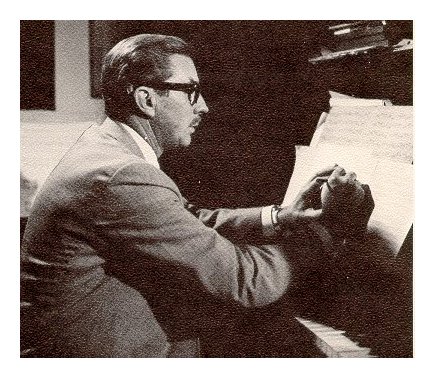

|
DAVID VAN VACTOR (1906-1994) David Van Vactor, the son of David Ellsworth Van Vactor, an inventor, housebuilder, factory owner, Church of Christ minister, and Mathilda Fenstermacher Van Vactor, was born in Plymouth, Indiana on May 8, 1906. He completed three years in pre-medicine at Northwestern University before enrolling in the School of Music there. At Northwestern, he earned the Bachelor of Music degree in 1928 and the Master of Music in 1935. He was a flute student of Arthur Kitti in the Chicago area. He studied composition with Anne Oldberg, Mark Wessel, Ernst Nolte, and Leo Sowerby. In Europe, he studied at the Wiener Akademie in Austria in 1929 and L'Ecole Normale of Paris in 1931. These studies prepared him for a long and fruitful career as composer, conductor, flutist, and teacher. The songs written in 1926 and 1927 are his earliest compositions. The first orchestral work, Chaconne for String Orchestra, was written in 1928; it was performed the same year by the Rochester Symphony conducted by Howard Hanson. While in Vienna in 1929, Van Vactor studied flute with Josef Niedermayr and composition with Franz Schmitt and harmony with Arnold Schoenberg. That year he composed the Five Small Pieces for Large Orchestra and Ten Variations on a Theme by Beethoven for Flute and Piano. 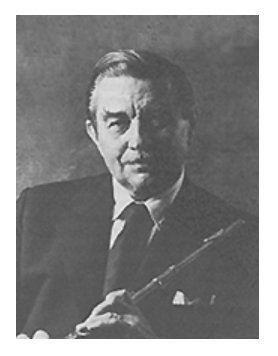 In 1930 he composed several more songs and
the Overture Cristobal Colon. From this point on his composition career
progressed steadily. In 1931 he traveled to Paris to study flute with Marcel
Moyse and composition with Paul Dukas. The Masque of Red Death won
honorable mention in the 1932 Swift Competition in Chicago. On his return
from Europe he began his professional career as a flutist with the Chicago
Symphony, a position he held for the next thirteen years. He was also assistant
conductor of the Chicago Civic Orchestra in 1933 and 1934. Van Vactor received
the Frederick Stock Scholarship in conducting in 1939 and became Dr. Stock's
protegé with the Chicago Symphony until Stock's death
in 1942. From 1936 to 1943, he taught theory and conducted the chamber orchestra
at his alma mater, Northwestern University. He started composing the First
Symphony in April 1936 and completed it in July 1937. It won a prize
of one thousand dollars in a competition sponsored by the New York Philharmonic
Symphony Orchestra. The first performance was given by that orchestra at
Carnegie Hall on January 19,1939 with the composer conducting.
In 1930 he composed several more songs and
the Overture Cristobal Colon. From this point on his composition career
progressed steadily. In 1931 he traveled to Paris to study flute with Marcel
Moyse and composition with Paul Dukas. The Masque of Red Death won
honorable mention in the 1932 Swift Competition in Chicago. On his return
from Europe he began his professional career as a flutist with the Chicago
Symphony, a position he held for the next thirteen years. He was also assistant
conductor of the Chicago Civic Orchestra in 1933 and 1934. Van Vactor received
the Frederick Stock Scholarship in conducting in 1939 and became Dr. Stock's
protegé with the Chicago Symphony until Stock's death
in 1942. From 1936 to 1943, he taught theory and conducted the chamber orchestra
at his alma mater, Northwestern University. He started composing the First
Symphony in April 1936 and completed it in July 1937. It won a prize
of one thousand dollars in a competition sponsored by the New York Philharmonic
Symphony Orchestra. The first performance was given by that orchestra at
Carnegie Hall on January 19,1939 with the composer conducting.During this productive period Van Vactor composed the Five Bagatelles for Strings, commissioned by Daniel Saidenberg for The Saidenberg Sinfonietta. Van Vactor's most often performed composition, Overture to a Comedy, No. 2, was written in 1941 and won the Juilliard Publication Prize in 1942. It was first performed by the Indianapolis Symphony. Performances followed by the Montreal Symphony, Philadelphia Orchestra, National Symphony, Chicago Symphony, New York Philharmonic, St. Louis Symphony, and the San Francisco Orchestra. His Quintet for Flute and Strings won the Society for American Music Publication Award in 1941. Under the sponsorship of the United States Department of State and the League of Composers, Van Vactor made four extended tours of South America, as a member of a woodwind quintet in 1941, and as a guest conductor of the orchestras of Rio de Janeiro and Santiago de Chile in 1945,1946, and 1965. He was also a visiting professor at the University of Chile during 1945-46. He had a listing influence on many young Chilean composers. His Sinfonia Breve was performed by the Philharmonic de Santiago, in 1965, the composer conducting. On several occasions in the ensuing years, he conducted the London Philharmonic Orchestra and the Palmengarten and Hessian Radio Symphony Orchestras in Frankfurt-am-Main. From 1943 to 1947, he served as assistant conductor of the Kansas City Philharmonic Orchestra and head of the Department of Theory and Composition at the Conservatory of Music. Van Vactor's second symphony was composed in 1943 with the title Music for the Marines. It was commissioned by the Sixth Marine Corps and was first performed by the Indianapolis Symphony Orchestra under the direction of Fabien Sevitzky. During this period, he ran a family farm in Marshall, Missouri, for the war effort. In November 1946 he completed his Introduction and Presto for Strings. This excellent work was first performed by the Allied Arts Orchestra of Kansas City with the composer conducting. In 1947, he founded the Department of Fine Arts at the University of Tennessee, Knoxville where he was a professor until 1976. He also appointed conductor of the Knoxville Symphony Orchestra in 1947, a post he held for the next twenty-five years. Under his direction, the orchestra experienced a period of growth and technical polish and made its first professional recording for the CRI label. The Pastorale and Dance for Flute and Strings was composed in 1947 also. Commissioned by Roy Harris for the Summer Music Festival at Colorado Springs College, it was first performed there with Van Vactor performing and Harris conducting. Van Vactor wrote a somewhat longer version for flute and string quartet. April 10, 1951 saw the first performance of the Violin Concerto, his fourth concerto. Previously had written the Concerto for Flute in 1931, the Concerto a Quattro for Three Flutes and Harp in 1935, and the Concerto for Viola, commissioned by Milton Preves and performed by the Chicago Symphony Orchestra in 1940. The new violin concerto was first performed with soloist William Starr and the Knoxville Symphony Orchestra under the direction of the composer. The following years saw the completion of five more symphonies: the third in 1958 and the fourth for chorus and orchestra in March 1971, with the title Walden. The Third Symphony was first performed by William Steinberg and the Pittsburgh Symphony Orchestra, and Walden received its first performance by the Knoxville Symphony Orchestra and the Maryville College Concert Choir with the composer conducting. The Fifth Symphony was commissioned as a part of the observance of the American Bicentennial by the Tennessee Arts Commission with the support of the National Endowment for the Arts. It was completed on September 19, 1975, and the first performance was given on March 11, 1976 by the Knoxville Symphony Orchestra with Arpad Joo conducting. The Sixth Symphony, of 1980, is in two versions composed more or less simultaneously. The orchestral version was begun in January of 1979 and the band version in February of the same year. The Seventh Symphony followed in 1982. The Suite for Orchestra on Chilean Folk Tunes of 1963 was first performed by the Knoxville Symphony Orchestra. Van Vactor's compositional style has been described by Katherine K. Preston in The New Grove Dictionary of Music and Musicians: "He writes in a concentrated and economical manner; his music is lyric, and often contrapuntal but unmistakably modern in idiom." He is attracted to traditional forms — passacaglia, chaconne, fugue, sarabande, etc. Dance rhythms are prominent in his works, and marches are often found as last movements. In 1957, Van Vactor was awarded a Fulbright grant to study comparative reactions of school children to educational concerts. Every Child May Hear, a book by David Van Vactor and Katherine D. Moore (The University of Tennessee Press, 1960), describes the findings of this project. Among his many awards, David Van Vactor was named "Composer Laureate of Tennessee" by the State Legislature in 1975. He was Professor Emeritus of Composition and Flute at the University of Tennessee, Knoxville. David Van Vactor and his wife Virginia Landreth, married on May 28, 1931, resided in Knoxville for forty years and after retirement in California. They had two children, daughter Raven Harwood (nee Adriaen Virginia, now deceased) and son David Landreth, living in Boston, Paris, and Normandy. Biography from Roger Rhodes Music,
Ltd.
Thanks to Pauline S. Bayne
& H. Stuart Garrett of the |
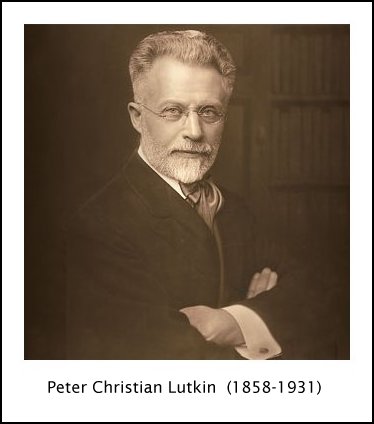 DVV: Do you remember Dean Lutkin [photo at left]?
DVV: Do you remember Dean Lutkin [photo at left]?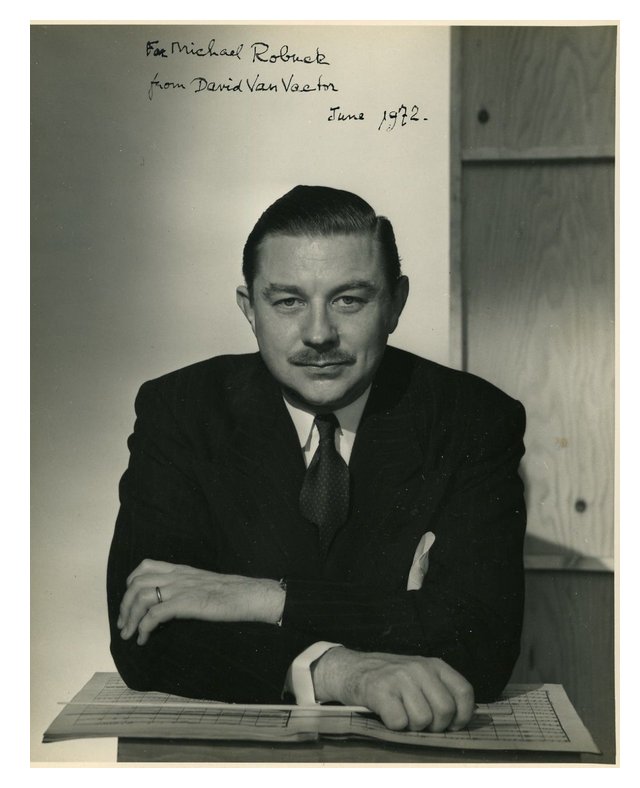 BD: I received the three records you sent, and a
couple of them are with that orchestra.
BD: I received the three records you sent, and a
couple of them are with that orchestra.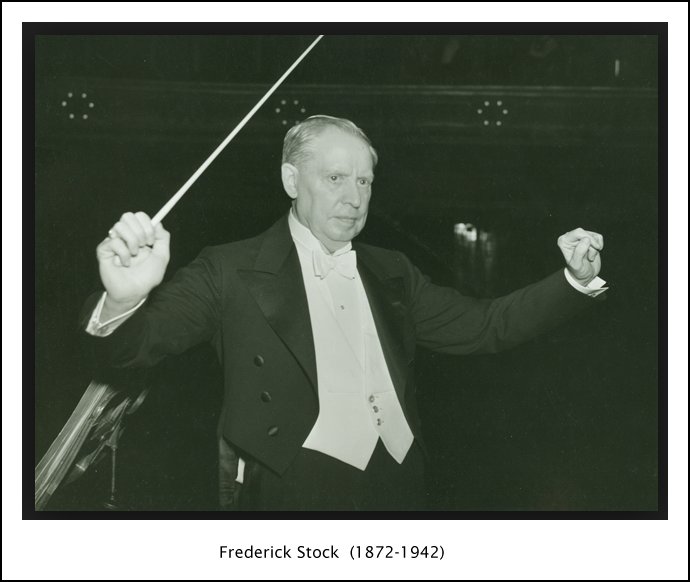 DVV: Many times. Many times. They would
dig something up from a different angle of thinking that was generally very
welcome to me. They’d reach out, but it would be like a playwright
and a good actor. A good actor finds things in the play to bring out
that maybe the playwright hadn’t quite intended. There are so many
instances of that. [Musing about a play] The English composer
Walton wrote music for the film of Henry
the Fifth, and my, that music is so great! I had the opportunity
to get to know him quite well by correspondence, because Stock played very
much of his music. Frederick Stock [photo at left] was a great innovator
of new music, and he’s a very fine composer himself. He did a beautiful
violin concerto, and a good many other things. Stock was very interested
in new scores. I made a survey of it one time, at Stock’s
suggestion. Toscanini played Barber’s Adagio for Strings, the only American
music he played that year. He and Koussevitzky, to just take those
two eastern conductors, did seven that particular year. Stock did fifty-eight
new pieces, American and European! And he worked them in the programs
so skillfully that nobody seemed to resent it. That audience welcomed
all this new music. Depending upon its length and harshness to the ear
at the time, he chose the length of the composition to work it into that
program so it was just as slick as anything, and they liked it!
DVV: Many times. Many times. They would
dig something up from a different angle of thinking that was generally very
welcome to me. They’d reach out, but it would be like a playwright
and a good actor. A good actor finds things in the play to bring out
that maybe the playwright hadn’t quite intended. There are so many
instances of that. [Musing about a play] The English composer
Walton wrote music for the film of Henry
the Fifth, and my, that music is so great! I had the opportunity
to get to know him quite well by correspondence, because Stock played very
much of his music. Frederick Stock [photo at left] was a great innovator
of new music, and he’s a very fine composer himself. He did a beautiful
violin concerto, and a good many other things. Stock was very interested
in new scores. I made a survey of it one time, at Stock’s
suggestion. Toscanini played Barber’s Adagio for Strings, the only American
music he played that year. He and Koussevitzky, to just take those
two eastern conductors, did seven that particular year. Stock did fifty-eight
new pieces, American and European! And he worked them in the programs
so skillfully that nobody seemed to resent it. That audience welcomed
all this new music. Depending upon its length and harshness to the ear
at the time, he chose the length of the composition to work it into that
program so it was just as slick as anything, and they liked it!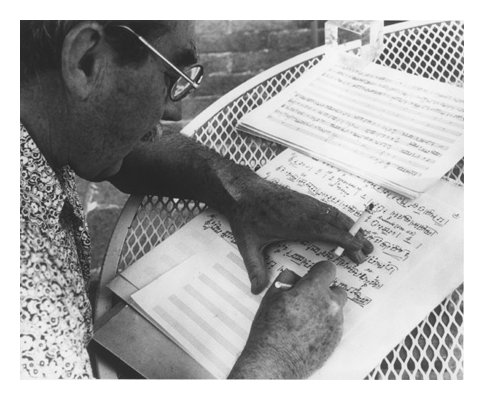 DVV: I’m a musician; that’s it. A musician
has to place himself where he’s needed at the moment, or at the time, as
performer and interpreter, and all that. So it’s really just being
a musician and doing the best you can for the circumstances as you find it,
as it comes your way. I believe that. I’m just a musician.
In other words, I use what talents I have, what I’ve accomplished by learning
about music, to the best advantage as the time comes. As it comes up,
you try to knock it off just right!
DVV: I’m a musician; that’s it. A musician
has to place himself where he’s needed at the moment, or at the time, as
performer and interpreter, and all that. So it’s really just being
a musician and doing the best you can for the circumstances as you find it,
as it comes your way. I believe that. I’m just a musician.
In other words, I use what talents I have, what I’ve accomplished by learning
about music, to the best advantage as the time comes. As it comes up,
you try to knock it off just right!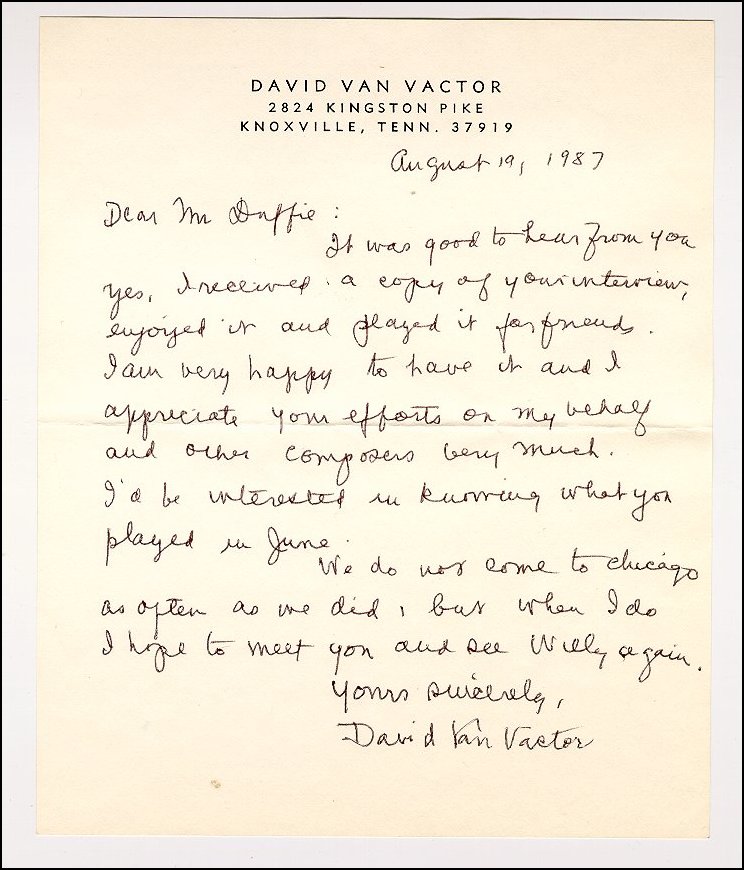
| David Van Vactor was born in 1906
in Plymouth, Indiana, and grew up in nearby Argos, a town of a thousand people.
His mother was a midwife and his father was a Protestant minister, house
builder and owner of a small factory that made porch columns. His father
was also and inventor, whose five claims on an aircraft designed to take
off and land vertically as well as horizontally were patented in 1940. Taught to play the flute by the town barber at an early age, Van Vactor played the piccolo in the town band from the time he was eight years old until he graduated from high school at seventeen, after which his family moved to Evanston, Illinois, so that he could go to Northwestern University where he earned his undergraduate and graduate degrees. Although he was a premedical student, he studied theory and composition and by his senior year in college had written some remarkable songs and the Chaconne for String Orchestra which was performed in 1928 by the Rochester Symphony, Howard Hanson conducting. Having no money to pay for medical school, he was convinced by the Dean of the School of music that he could make his way in the world as a professional musician so long as he sought the best training available, which meant a year or more of study in Europe. After graduation, he set out for Vienna and paid for his passage by playing flute recitals during the crossing. The great event of his first ocean voyage was meeting his future wife, then a girl of sixteen, also from Evanston. He spent the next nine months in Vienna studying flute with Josef Niedemayer, Harmony with Arnold Schoenberg and composition with Franz Schmidt. In 1931 he took his bride to France for five months so he could study flute with Marcel Moyse and composition with Paul Dukas, and in the fall of that year he took second chair in the flute section of the Chicago Symphony Orchestra, in while he played for thirteen seasons under Frederick Stock, whose protege he became as a conductor. It was during this period - while playing in the orchestra, teaching theory and conducting the chamber orchestra at Northwestern, in addition to teaching thirty-five flute lessons a week - that Van Vactor wrote some of his major works. His Quintet for Flute and String Quartet (1932) won an award from the Society for the Publication of American Music and was published by George Schirmer. Frederick Stock gave the first performance of Van Vactor's Concerto a Quattro for Three Flutes, Harp, and Orchestra in 1935, and the Chicago Symphony Orchestra played it many times in the ten years that followed. Van Vactor achieved a national reputation when he conducted the New York Philharmonic Symphony in January of 1939 in the first performance of his symphony in d, No. 1 which had won first prize in a competition sponsored by the orchestra. The new symphony was well received and subsequently was played in Chicago and Cleveland. As a result, his music would be played by every major orchestra in America, and many commissions followed: the Concerto for Viola written for Milton Preeves, premiered at Ravinia Park by the Chicago Symphony in 1940; five Bagatelles for Strings written for the Saidenberg Symphonietta of New York; Credo (1941) and Music for the Marines (1943) two large works both commissioned by Fabian Sevitzky for the Indianapolis Symphony. Van Vactor's Overture to a Comedy No. 2 won the Juilliard Publication Award in 1942 and was played in Indianapolis, Montreal, Washington, Philadelphia, Chicago, New York, St. Louis and San Francisco. His String Quartet No. 1, written for the Jacques Gordon Quartet in 1940, was taken on tour by the Budapest String Quartet in 1946. In 1941-46, he toured South America three times, first with the American Woodwind Quintet, and in 1945 and 1946 he returned to conduct his own works with the Municipal Orchestra of Rio de Janeiro and the Orquesta Sinfonica de Chile. In 1944 and 1945 he ran a farm in Marshall, Missouri for the war effort. When he was Assistant Conductor of the Kansas City Philharmonic, 1945 to 1947, he founded the Allied Arts Orchestra, devoted to performing contemporary music. Recitativo and Saltarello, Cantata for Treble Voices, Introduction and Presto for Strings, and Pastorale and Dance for Flute and Strings were written during these years when he was living in Missouri and traveling to South America. Roy Harris had commissioned Pastorale and Dance and premiered it with the Colorado College Orchestra in the summer of 1947, with David Van Vactor as flute soloist. In the fall of that year, Van Vactor founded the Fine Arts Department at the University of Tennessee in Knoxville and became conductor of the Knoxville Symphony Orchestra, a post he held for twenty-five years. His major works written after he moved to Tennessee were String Quartet No. 2 (1949), Concerto for Violin (1951) and The New Light (1954). In 1953, he conducted the London Philharmonia. In 1957, a Guggenheim Fellowship allowed him to spend part of the year in Frankfurt, Germany conducting several orchestras and working on his third symphony. The Trojan Women Suite was also started during this sojourn in Frankfurt. Upon his return to Knoxville in September of that year, he received a commission from the Louisville Orchestra and quickly wrote Fantasia, Chaconne and Allegro which was performed in Louisville in November of 1957 and recorded by Columbia, Robert Whitney conducting. Returning to Germany every summer for the next ten years, he reacquainted himself with the many pieces he had written in the `30's and `40's by recording them with the Hessichen Rundfunk Orchestrer. With the orchestra in Frankfurt and the Knoxville Symphony, he also recorded works by a number of American composers, some of whom he had commissioned through a Ford Foundation grant. Many of these recordings would be released on the CRI label. The Louisville piece and the new symphony which he finished in the spring of 1958 mark the end of the first half of his creative output, from a stylistic standpoint. In 1957, he had begun to use the tone row as a compositional device. Works that benefited most from this practice were longer ones, with several movements, since all the movements of a work would draw on the same thematic material; hence greater unity was achieved. While Van Vactor is resolutely tonal in his approach to serial technique, the character of his music written after 1957 is decidedly different from the Symphony No. 3 starting with Trojan Women Suite (1959) and Suite for Woodwind Quintet (1959), the tunes are quirkier, the harmonies richer, and more freedom is evident in their development. The Suite for Piano (1962), Sinfonia Breve (1964) and Four Etudes for Winds and Percussion (1968) are the culmination of the experimental phase of his work. In 1965, he returned to Chile for six months to conduct twelve concerts and play two flute recitals and to meet with the young composers whom he had had the privilege to reach twenty years before. After 1970 followed the fruit of his retirement: two large pieces for symphonic band, Episodes - Jesus Christ for double chorus and orchestra, thirty-six pieces for woodwinds, a saxophone concerto and four symphonies. In 1975, he was named Composer Laureate of the State of Tennessee by the state legislature, a life-time honor. He retired from the University of Tennessee in 1976. His magnificent house set high on the bank of the Tennessee River, overlooking the foothills of the Great Smoky Mountains was his sanctuary. Three months in the winter at his daughter's home in Los Angeles, two weeks in Honoloulu, annual trips to Boston and Maine to visit his son's family, and to Rome and Lake Como, were the rewards of old age and kept him productive. In his manuscripts, there are continual references to the places he loved. His Symphony No. 7 was finished in 1982. His eighth symphony remains unfinished. Always by his sides was his wife, who took care of all practical matters so that he could write music. In 1989, they moved to Los Angeles to be near their daughter. Van Vactor died at home in Century City March 24, 1994, forty-five days before his eighty-eighth birthday. © 1995 David Landreth Van Vactor |
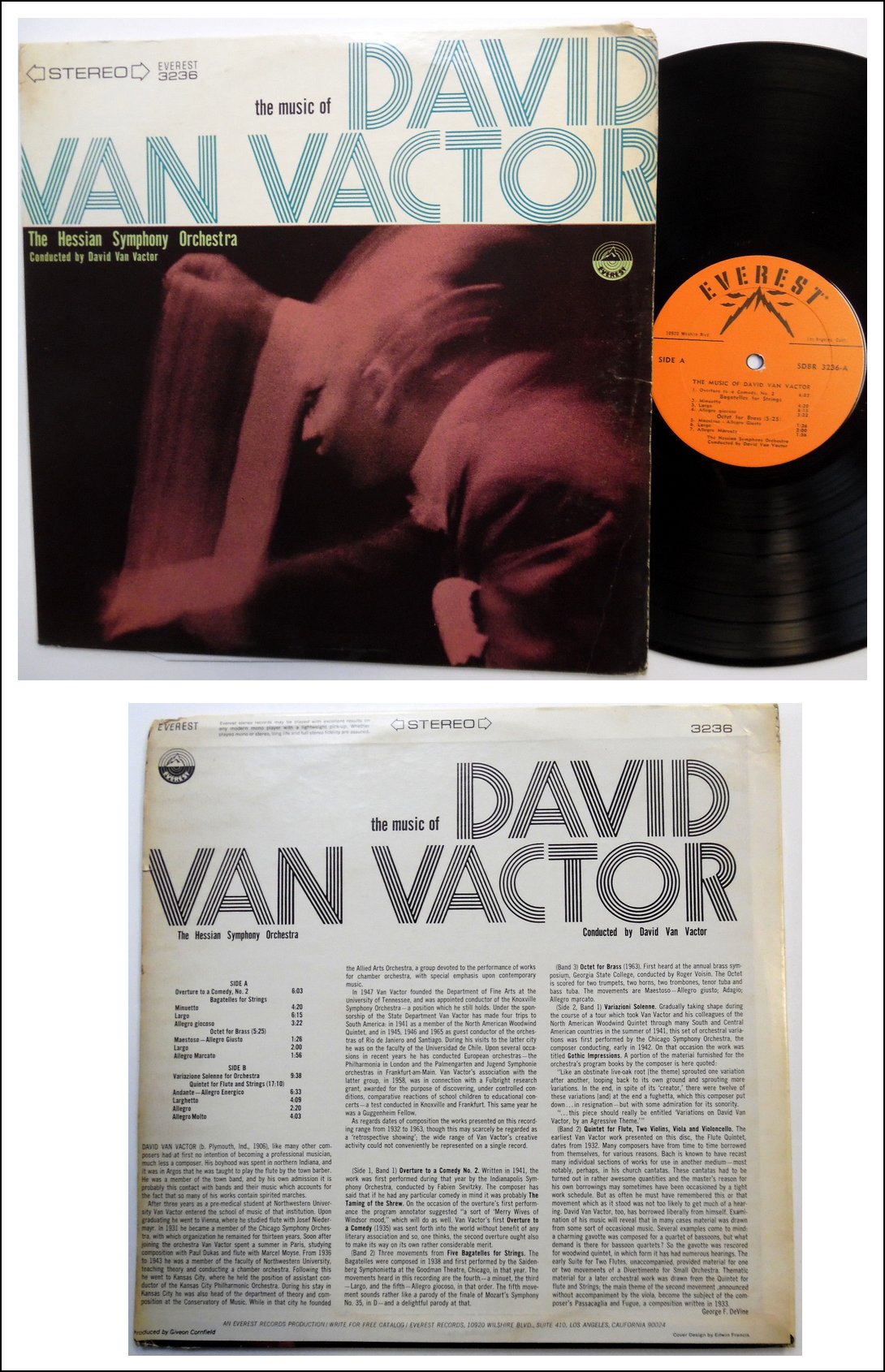
| The following letter, addressed to
the Editor of the Knoxville News-Sentinel and dated December 24, 1972, appeared
in the "News-Sentinel Forum" in January of 1973. It is a brief but deeply
felt appreciation of David Van Vactor, the conductor, composer, flutist and
educator who, from the late 1940's to the mid- 70's, made such a vital contribution
to the musical life of Knoxville, Tennessee, and to the life of countless
young people, myself included, who looked to him for inspiration. EDITOR, The News-Sentinel: I read of conductor David Van Vactor's resignation from the Knoxville Symphony Orchestra with deep sadness. Your words of editorial were quite appropriate in evaluating the tremendous contribution he has made to Knoxville's cultural life. A special note should also be made of his evangelical concern and care for the musical education of the children of Knoxvi1le. I still remember vividly the excitement at Fountain City Grammar School in the late 1940's when we were preparing to go to a Young People's Concert given by the K.S.O. A lot had to do with the half day out of school, of course, and with the trip down town with good friends, but a lot also had to do with seeing a full symphony orchestra, hearing beautiful music, and learning about it first hand from that debonair, mysterious man on the podium - David Van Vactor. The impression these concerts left on all of us was enormous. The afternoon seemed to unfold in another world. In fact it took place within the old U.T. gymnasium complete with basketball goals and occasional appearances by tennis-shoed undergraduates intent upon crossing the auditorium come hell or Beethoven. Yet it seemed like Carnegie Hall and, in retrospect, it may have been even better than Carnegie Hall. David Van Vactor was not content, however, just that we hear music. We were supposed to compose it as well - so he organized the "Tune Contests". And then we were supposed to play it as well - so he organized the "Young Performer's Contests". He never seemed content and kept us all (and here there could be a long list of young Knoxville musicians) working to come up to his standards. He represented an ideal of complete self-dedication and of musical and personal integrity. In the mid-fifties while in high school and an active member of the K.S.O., I saw he had his work cut out not only in educating the young people, but also in making Knoxville conscious of the importance of the orchestra and of its place in the community. He insisted that an active cultural life must begin at home - the concert being only the final link in a chain of day-to-day interactions between community and musician. Today one can see how brilliantly he has succeeded on all accounts. Dave's resignation from the Knoxville Symphony Orchestra marks the end of an era, but for those of us, "the young people", who received our stimulus from him and the activities of the K.S.O., the era is unending - permanently impressed upon every fiber of our thought. We are the most fortunate of all, for we had the benefit of his extraordinary talents and guidance during our formative years and we have the example of his imagination and determination for the rest of our lives. Richard Trythall December 24, 1972 |
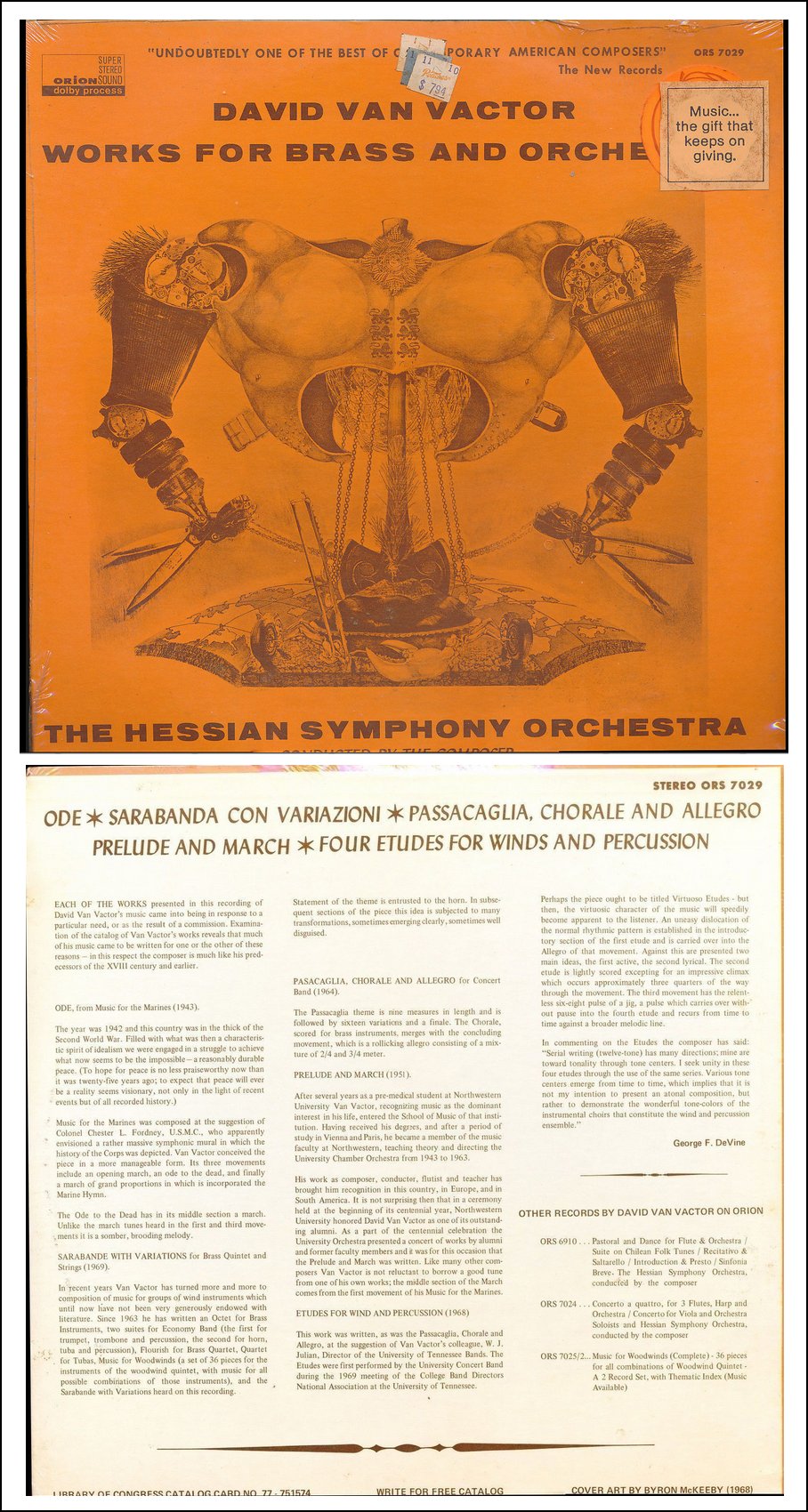
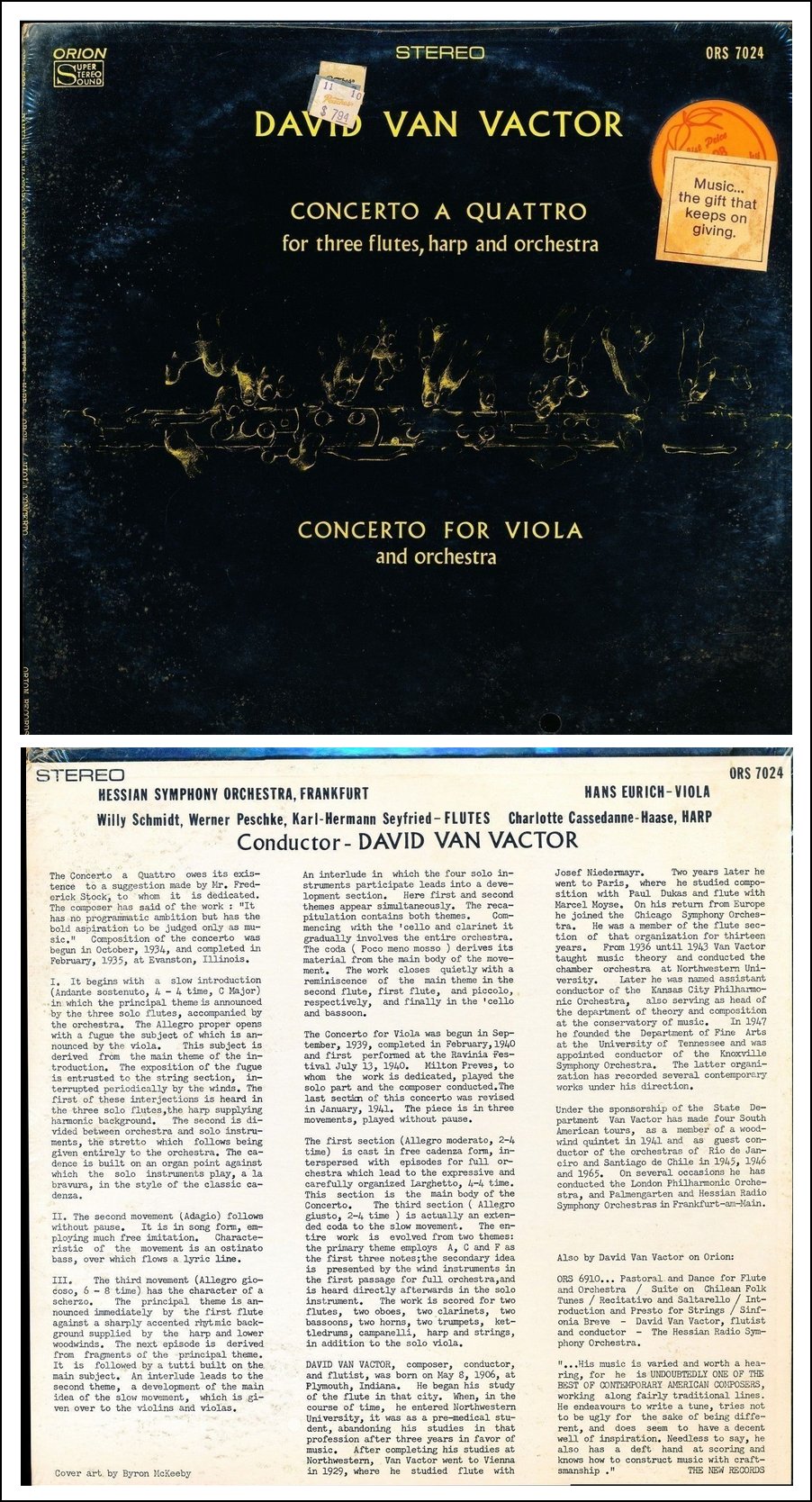
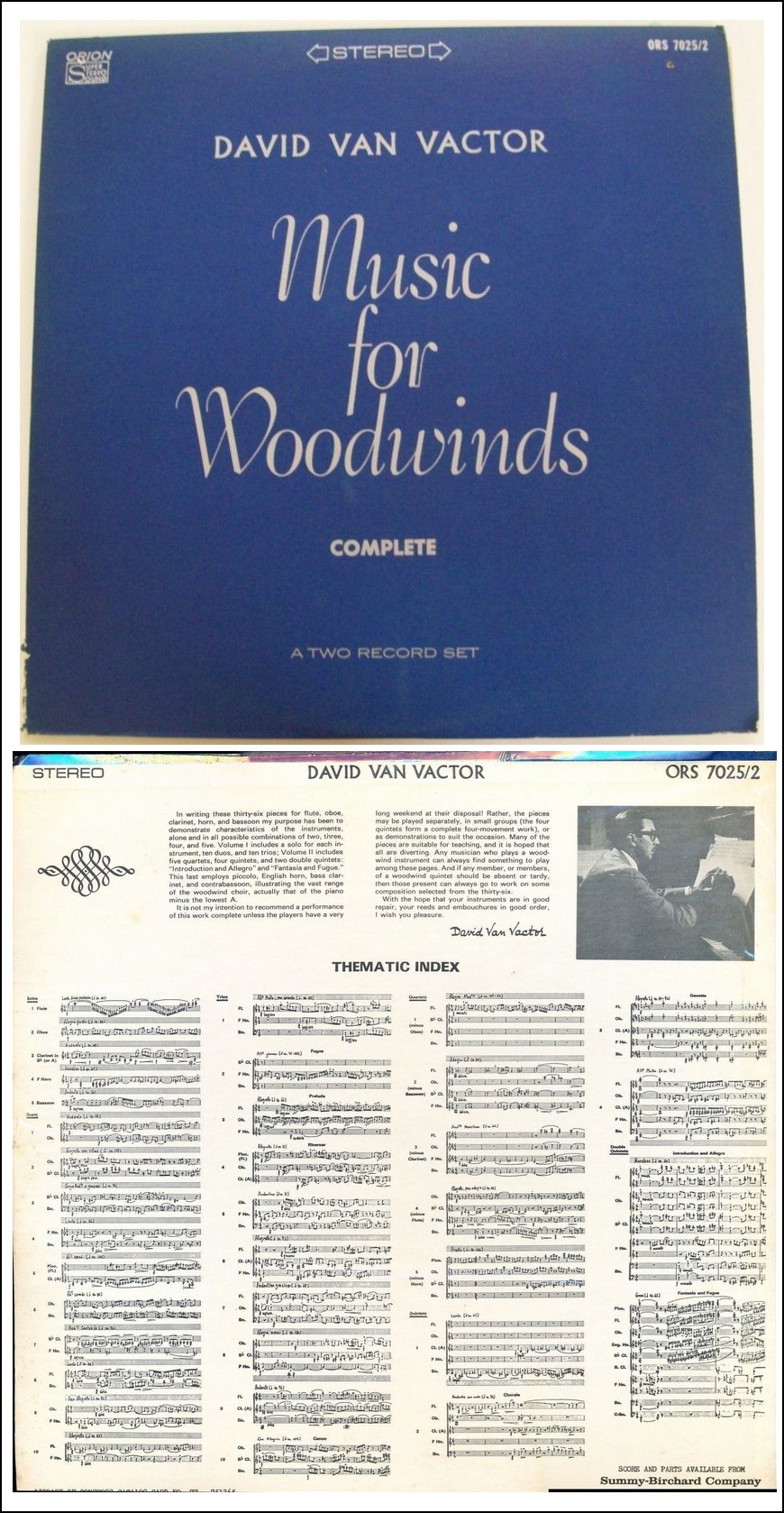
|
This interview was recorded on the telephone on March 15, 1986. Portions (along with recordings) were used on WNIB two months later, and again in 1996. A full rogram (without interview) was presented on WNIB in 1991. One piece of music was included as part of the in-flight package aboard Delta Airlines in March-April of 1988. A copy of the unedited audio was placed in the Archive of Contemporary Music at Northwestern University. This transcription was made and posted on this website in 2012.
To see a full list (with links) of interviews which have been transcribed and posted on this website, click here.
Award - winning broadcaster Bruce Duffie was with WNIB, Classical 97 in Chicago from 1975 until its final moment as a classical station in February of 2001. His interviews have also appeared in various magazines and journals since 1980, and he now continues his broadcast series on WNUR-FM, as well as on Contemporary Classical Internet Radio.
You are invited to visit his website for more information about his work, including selected transcripts of other interviews, plus a full list of his guests. He would also like to call your attention to the photos and information about his grandfather, who was a pioneer in the automotive field more than a century ago. You may also send him E-Mail with comments, questions and suggestions.